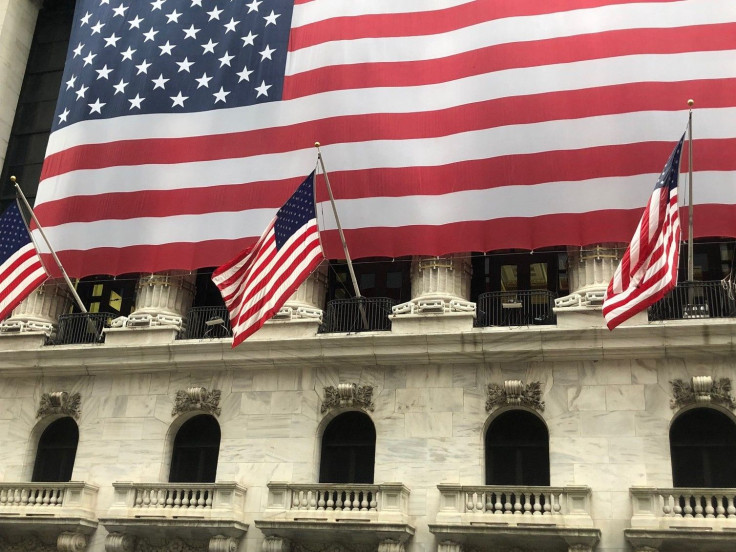Friday’s Stock Market Close: US Equities Mixed As Trump Revokes Hong Kong’s Special Trade Status

KEY POINTS
- Trump will revoke Hong Kong’s favored trade status with the U.S.
- Trump blamed the Chinese government and the WHO for the coronavirus pandemic
- U.S. personal income grew by 10.5% month-over-month in April, but spending dropped 13.6%
U.S. stocks finished mixed on Friday in wild trading as President Donald Trump said he will revoke Hong Kong’s special trade status, but did not say anything about the U.S. trade deal with China.
The Dow Jones Industrial Average slipped 17.53 points to 25,383.11, while the S&P 500 rose 14.58 points to 3,044.31 and the Nasdaq Composite Index jumped 120.88 points to 9,489.87.
For the week, the Dow gained 3.75%.
Friday’s volume on the New York Stock Exchange totaled 7.38 billion shares with 1,425 issues advancing, 27 setting new highs, and 1,533 declining, with 13 setting new lows .
Active movers were led by General Electric Co. (GE), Annaly Capital Management Inc. (NLY) and Adaptimmune Therapeutics (ADAP).
In a Friday press conference, Trump said he will revoke Hong Kong’s favored trade status with the U.S. in response to China moving ahead with a new security law in Hong Kong that critics charge will end the island’s autonomy. The U.S. will also sanction some officials in Hong Kong and mainland China.
“I am directing my administration to begin the process of eliminating policy exemptions that give Hong Kong different and special treatment,” Trump said.
“My announcement today will affect the full range of agreements that we have with Hong Kong, from our extradition treaty, to our export controls and technologies,” Trump added. “We will take action to revoke Hong Kong’s preferential treatment as a separate customs and travel territory from the rest of China.”
Trump also criticized the Chinese government for its "malfeasance" and blamed the World Health Organization for the coronavirus pandemic. Trump said the U.S. is "terminating" its relationship with the WHO.
However, traders are likely relieved that Trump did not cancel a phase one trade deal with China.
White House economic adviser Larry Kudlow said Friday: “the U.S. government is ... I’ll use the word furious at what China has done in recent days, weeks and months. They have not behaved well and they have lost the trust, I think, of the whole Western world.”
Global leaders also condemned China’s new law in Hong Kong.
In a joint statement, U.S., U.K., Australia and Canada, expressed their “deep concern” regarding China’s proposed law.
“Hong Kong has flourished as a bastion of freedom. The international community has a significant and long-standing stake in Hong Kong’s prosperity and stability,” they said. “Direct imposition of national security legislation on Hong Kong by the Beijing authorities, rather than through Hong Kong’s own institutions… would curtail the Hong Kong people’s liberties.”
The move will “dramatically erode Hong Kong’s autonomy and the system that made it so prosperous,” they added.
Analysts fretted over worsening U.S.-China relations.
“A complete breakdown of supply chains and international trade, primarily between the two largest economies [U.S. and China], would justify equities trading drastically lower,” wrote JPMorgan strategist Marko Kolanovic.
Federal Reserve Chairman Jerome Powell said on Friday that the central bank’s Main Street lending facility – designed to lend to small- and medium-sized businesses -- is “days away” from making its first loan.
The Chicago Purchasing Manager's Index fell to 32.2 in May from 35.4 in April.
The University of Michigan's Survey of Consumers said that the final reading of its consumer sentiment index came in at 72.3, up from 71.8 in April.
U.S. personal income grew by 10.5% month-over-month in April. But spending dropped 13.6% month-over-month. The headline personal consumption expenditure price index slowed down to 0.5% in April year-over-year, while the core PCE price index dropped to 1% year-over-year.
The U.S. trade deficit in goods rose by 7.2% in April. The Commerce Department also reported a 0.4% rise in advanced wholesale inventories and a 3.6% decline in advanced retail inventories.
Overnight in Asia, markets finished mixed. The Shanghai Composite edged up 0.22%; Hong Kong’s Hang Seng fell 0.74%; while Japan’s Nikkei-225 slipped 0.18%.
In Europe markets traded lower, as Britain’s FTSE-100 fell 1.33%, while France’s CAC-40 dropped 0.7% and Germany’s DAX slipped 0.92%.
Crude oil futures gained 4.09% at $35.09 per barrel, Brent crude dropped 0.98% at $37.47. Gold futures edged climbed 1%.
The euro gained 0.22% at $1.101 while the pound sterling rose 0.22% at $1.2349.
The yield on the 10-year Treasury plunged 8.09% to 0.648% while yield on the 30-year Treasury dropped 4.55% to 1.407%.
© Copyright IBTimes 2025. All rights reserved.




















